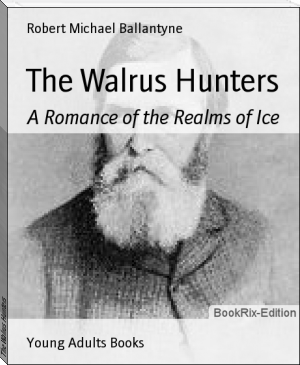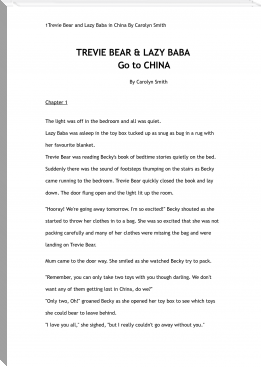The Walrus Hunters - Robert Michael Ballantyne (best book clubs .txt) 📗

- Author: Robert Michael Ballantyne
Book online «The Walrus Hunters - Robert Michael Ballantyne (best book clubs .txt) 📗». Author Robert Michael Ballantyne
"Have you any more strange things in your bundle?" asked the Eskimo, whose curiosity was awakened by what had already been extracted from it. "Have you some of the tee, or the fire-water, or any more of the thing that smokes--what you call it?"
"Tubuko--no, I have no more of that than you saw in the fire-bag. The white men sometimes call it bukey, and I have no fire-water or tee. Sometimes we put a nice sweet stuff into the tee which the white men call shoogir. The Indian girls are very fond of shoogir. They like it best without being mixed with water and tee. But we have that in our own land. We make it from the juice of a tree."
The interest with which Cheenbuk gazed into the girl's face while she spoke, was doubtless due very much to the prettiness thereof, but it is only just to add that the number and nature of the absolutely new subjects which were thus opened up to him had something to do with it. His imperfect knowledge of her language, however, had a bamboozling effect.
"Here is a thing which I think you will be glad to see," continued the girl, as she extracted a small hatchet from the bundle.
"Yes indeed; that is a _very_ good thing," said the youth, handling the implement with almost affectionate tenderness. "I had one once--and that, too, is a fine thing," he added, as she drew a scalping-knife from her bundle.
"You may have them both," she said; "I knew you would need them on the journey."
Cheenbuk was too much lost in admiration of the gifts--which to him were so splendid--that he failed to find words to express his gratitude, but, seizing a piece of firewood and resting it on another piece, he set to work with the hatchet, and sent the chips flying in all directions for some time, to the amusement, and no small surprise, of his companion. Then he laid down the axe, and, taking up the scalping-knife, began to whittle sticks with renewed energy. Suddenly he paused and looked at Adolay with ineffable delight.
"They are good?" she remarked with a cheerful nod.
"Good, good, very good! We have nothing nearly so good. All our things are made of bone or stone."
"Now," returned the girl, with a blink of her lustrous eyes, and a yawn of her pretty mouth, which Nature had not yet taught her to conceal with her little hand, "now, I am sleepy. I will lie down."
Cheenbuk replied with a smile, and pointed to the canoe with his nose.
Adolay took the hint, crept into the nest which the gallant youth had prepared for her, curled herself up like a hedgehog, and was sound asleep in five minutes.
The Eskimo, meanwhile, resumed his labours with the scalping-knife, and whittled on far into the night--whittled until he had reduced every stick within reach of his hand to a mass of shavings--a beaming childlike glow of satisfaction resting on his handsome face all the while, until the embers of the fire began to sink low, and only an occasional flicker of flame shot up to enlighten the increasing darkness. Then he laid the two implements down and covered them carefully with a piece of deerskin, while his countenance resumed its wonted gravity of expression.
Drawing up his knees until his chin rested on them, and clasping his hands round them, he sat for a long time brooding there and gazing into the dying embers of the fire; then he rose, stretched himself, and sauntered down to the shore.
The night, although dark for the Arctic regions at that time of the year, was not by any means obscure. On the contrary, it might have passed for a very fair moonlight night in more southern climes, and the flush of the coming day in the eastern sky was beginning to warm the tops of the higher among the ice-masses, thereby rendering the rest of the scene more coldly grey. The calm which had favoured the escape of our fugitives still prevailed, and the open spaces had gradually widened until the floes had assumed the form of ghostly white islets floating in a blue-black sea, in which the fantastic cliffs, lumps, and pinnacles were sharply reflected as in a mirror.
There was a solemnity and profound quietude about the scene and the hour which harmonised well with the sedate spirit of the young Eskimo, as he stood there for a long time contemplating the wonders and the beauties of the world around and about him.
We know not what passes through the minds of untutored men in such circumstances, but who shall dare to say that the Spirit of their Creator may not be holding intercourse with them at such times?
Turning his back at length upon the sea, Cheenbuk returned to the camp, lay down on the couch which he had made for himself on the opposite side of the fire from the canoe, and, in a few moments more, was in the health- and strength-restoring regions of Oblivion.
CHAPTER TWELVE.
HOME--SWEET HOME--AND SMOKE, ETCETERA.
The favouring calm continued until Cheenbuk with his companion arrived at Waruskeek.
It was about mid-day when their canoe turned round the headland and entered the inlet near the head of which lay the Eskimo village.
The boy Anteek happened to be standing on the shore at the time, beside the young girl Nootka. They were looking out to sea, and observed the canoe the moment it turned the point of rocks.
"Hoi-oi!" yelled Anteek with an emphasis that caused the inhabitants of the whole village to leap out of every hut with the celerity of squirrels, and rush to the shore. Here those who had first arrived were eagerly commenting on the approaching visitors.
"A kayak of the Fire-spouters!" cried Anteek, with a look of intense glee, for nothing was so dear to the soul of that volatile youth, as that which suggested danger, except, perhaps, that which involved fun.
"The kayak is indeed that of a Fire-spouter," said old Mangivik, shaking his grey head, "but I don't think any Fire-spouter among them would be such a fool as to run his head into our very jaws."
"I'm not ready to agree with you, old man," began Gartok.
"No; you're never ready to agree with any one!" growled Mangivik parenthetically.
"For the Fire-spouters," continued Gartok, disregarding the growl, "are afraid of nothing. Why should they be when they can spout wounds and death so easily?"
Poor Gartok spoke feelingly, for his wounded leg had reduced his vigour considerably, and he was yet only able to limp about with the aid of a stick, while his lieutenant Ondikik was reduced to skin and bone by the injury to his back.
Suddenly Mangivik became rather excited.
"Woman," he said earnestly to his wife, who stood beside him, "do you see who steers the kayak? Look, your eyes are better than mine."
"No. I do not."
"Look again!" cried Anteek, pushing forward at that moment. "He is not a Fire-spouter. He is _one of us_! But the one in front is a Fire-spouter woman. Look at the man! Don't you know him?"
There was an intensity of suppressed fervour in the manner of the boy, and an unwonted glitter in his eyes, which impressed every one who noticed him.
"Yes, he is one of us," said Mangivik, shading his eyes with one hand, "and he has stolen a Fire-spouting girl with her kayak!"
There was a look of pride in the face of the old man as he spoke, but it was as nothing to the shout of triumph--the shriek of ecstasy--that burst from Anteek as he uttered the word--"Cheenbuk!"
Just then a strong clear voice came rolling over the water to the shore, and a roar of joy burst from the whole assemblage, for there was no mistaking the voice of their comrade and best hunter. The hearts of Nootka and her mother beat with no ordinary flutter as they heard the familiar shout, and as for Anteek, he went into a paroxysm of delight, which he sought to relieve by bounding and yelling till the canoe touched the shore. Then, by a powerful effort, he subdued himself, and turned his energies into a prolonged look of unutterable amazement at Adolay.
Of course the eyes of the entire population were turned in the same direction--for Eskimos do not count it rude to stare--so that the poor girl felt somewhat abashed, and shrank a little behind her stout protector.
Observing the action, Cheenbuk took hold of her arm gently and led her towards his mother.
"This is my mother, Adolay," he said; "she will take care of you."
"Your _wife_?" asked Mrs Mangivik, with an anxious look.
"No, not my wife," replied the youth, with a laugh. "Take her to our hut, you and Nootka, while I go and speak with the men.--She saved my life, father," he added, turning to Mangivik, "be good to her."
On hearing this, Nootka and her mother took the girl affectionately by both hands and led her away.
Cheenbuk meanwhile went up to the big hut, just outside of which was held a meeting of nearly the whole population, to receive an account of his adventures from the man whom they had long ago given up as lost.
"My friends," he began, surveying the expectant assembly with a grave straightforward look, "when I went by myself to the Whale River, my intention was to hunt around and find out if there were many birds and beasts on lands near to it, and if many men lived or hunted there, for it came into my mind that this little island of Waruskeek is not the best place in the world to live in, for our tribe is continually increasing. I thought that if there were Fire-spouters there already, we must be content with the lands we have got, for it is not right to take what belongs to other men."
Cheenbuk paused here and looked round, because he knew that he was treading on somewhat new and delicate ground in thus asserting a principle of _right_; and he was not mistaken, for, while the most of his audience remained silent, several of them expressed dissent.
"Besides," he continued, "it is not wise to attack men with fire-spouters, which send into their enemies heavy little things like that which was lately picked out of Gartok's leg; the same as still seems to be sticking in Ondikik's back."
"Ho! ho!" exclaimed a number of the men, as if that truth commended itself to their understandings.
"Well, when I got to the river, I found plenty of white-whales at the mouth of it, and great plenty of birds of all kinds, and of deer--a land good for man to dwell in, with many trees that would make sledge-runners, and much dead wood for our fires, and no one living there, nor signs of anybody. Then I thought to myself, Why should we live always among the floes and bergs? The few Fire-spouters whom we have seen and heard of have better food, better homes, better tools of every kind. Why should not we have the same?"
Here the wise Cheenbuk drew from the breast of his seal-skin coat the axe





Comments (0)